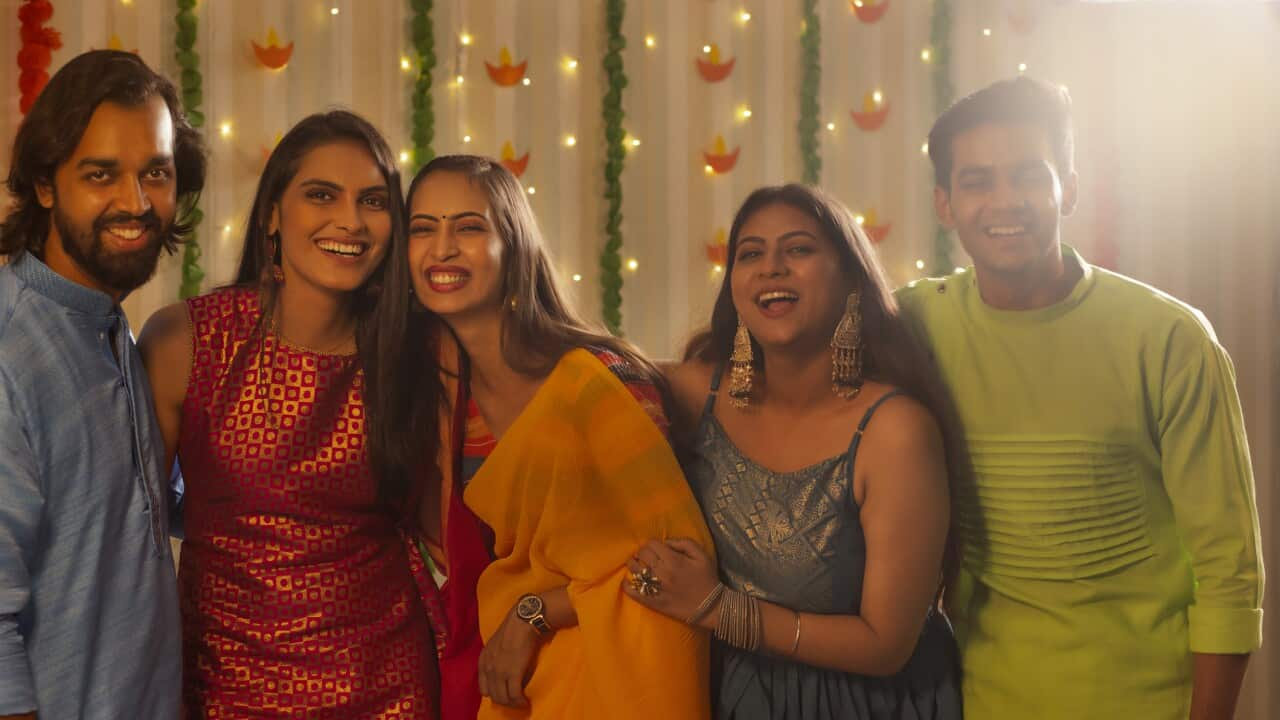SBS Learn English ќе ви помогне подобро да зборувате, да ја разберете и да се поврзете со вашата околина во Австралија - погледнете ги сите епизоди.
Оваа лекција е наменета за луѓе со средно ниво на англиски јазик. Откако ќе ја слушнете оваа лекција, проверете го вашето знаење со нашиот квиз.
Белешки за учење
Различни фрази што можете да ги користите кога давате комплимент за нечиј стил:
- You’ve nailed the look.
- You’ve got the look down.
- I love that look.
- That outfit is on point.
- Your outfit is not bad either.
- Your outfit is very stylish.
- You’re pulling that off so well!
- You’ve got a great sense of style.
Примери на фрази со кои можете да одговорите на комплимент:
- Coming from you, that really means something.
- Thanks! I don’t usually get glammed up.
- You’re just flattering me.
- You’re making me blush!
- Thanks! I just wanted to look the part.
Колоквијални изрази:
To nail something means to do it perfectly.
When something is on point, it means it’s perfect, exactly right, or impressive.
To pull off an outfit means to looks good wearing an outfit.
If someone has a great sense of style, they know how to choose clothes and accessories that look good together and are fashionable.
We can say, ‘You’re making me blush’ when someone says something nice and makes us feel shy, or happy.
To look the part means to dress or act in a way that fits a certain situation.
Речник:
The word ‘look’ can refer to how someone appears as in ‘you look well today!’.
A kurta is a traditional South Asian top, usually worn by men but also sometimes by women. It’s like a long shirt, often colourful and patterned. People wear it for celebrations, special occasions, or just for comfort.
An outfit is what someone wears, including all the clothes and accessories together. You use the word ‘outfit’ when you want to talk about a complete look, not just one piece of clothing.
If someone or something is stylish, it means it looks fashionable and well put-together.
Thrifting means buying second-hand clothes, usually from a thrift store or charity shop.
Glammed up is short for glamorous. It is an informal way of describing someone who is wearing fancy clothes and done their hair and makeup nicely for a party or celebration.
To flatter someone is to give someone compliments that mya or may not be true in order to make them feel admired, even if h.
To blush is when your cheeks turn red or pink usually when you feel shy, embarrassed, or happy.
Фокус на учење:
Како, кога и на кого даваме и примаме комплименти е различно во различни култури. Во нашиот дијалог, и Алан и Клер даваат и примаат комплименти.
Може да биде тешко да знаете што да кажете кога некој ви дава комплимент затоа што не сакате да изгледате премногу горди - но не сакате ниту да не се согласите со нив! Кога Клер прво го комплиментира Алан, тој едноставно се заблагодарува, а потоа нуди и свој комплимент за возврат:
- Thanks! Your outfit’s not bad either — very stylish. You’re pulling that off so well!
Друг начин скромно да прифатите комплимент е да изгледате како да го отфрлате или минимизирате, како што прави Клер кога одговара на комплиментот на Алан. Таа му кажува на шега да не го прави тоа и нагласува дека тоа не е нешто што вообичаено го прави:
- Oh, stop it! I don’t usually get glammed up.
Алан, исто така, го минимизира следниот комплимент од Клер преправајќи се дека е засрамен и минимизирајќи го трудот што го вложил за да изгледа добро.:
- Now, you’re just flattering me. You’re making me blush! I just wanted to look the part for Diwali.
Заблагодарувањето на луѓето и минимизирањето на важноста или напорот што го вложиле за она што го комплиментираат се вообичаени начини на кои реагираме на комплимент во Австралија. Дали го правите истото во другите култури што ги познавате? Проверете дали можете да ги чуете луѓето како го прават ова околу вас.
Транскрипт:
(Note: This is not a word-for-word transcript)
SBS acknowledges the Traditional Custodians of Country and their connections and continuous care for the skies, lands, and waterways throughout Australia.
You’re at a Diwali celebration, the Hindu festival of lights signifying the victory of good over evil or light over darkness.It’s all new to you! Lights twinkle everywhere, music plays softly, and the smell of sweets fills the air.
Isn't living in Australia wonderful because you get to experience so many different cultures?
I’m Josipa, and in this episode of Learn English, you’ll learn useful phrases to compliment someone’s style and how to respond to compliments.
We’ll practise so you can feel confident at any event or celebration—like Diwali, where Allan and Claire were invited and asked to wear traditional Indian clothes.
Claire
Allan, you’ve nailed the look tonight! That kurta is on point.
Allan
Thanks! Your outfit’s not bad either — very stylish. You’re pulling that off so well!
Claire
Oh, stop it! I don’t usually get glammed up. Coming from you, that really means something. You’ve got a great sense of style.
Allan
Now, you’re just flattering me. You’re making me blush! I just wanted to look the part for Diwali.
Allan and Claire sure know how to compliment each other. Let’s take a closer look at the phrases the used.
Allan, you’ve nailed the look tonight! That kurta is on point.
You’ve nailed the look. To ‘nail’ something means to do it perfectly. When you say someone has nailed the look, you’re saying that they look amazing, fantastic or great.
We all know that we use the word ‘look’ when we want to see something, but in English, ‘look’ can also mean how someone appears. It’s a simple word, but very useful when giving compliments about someone’s appearance.
You could also say,
You’ve got the look down.
Or,
I love your look.
And it all means the same thing: the person who’s nailed the look, got the look down, or is loving the look simply looks amazing. They have made the right choices about the clothes to wear for that occasion.
Claire also said,
That kurta is on point.
When something is ‘on point’, it means it’s perfect, exactly right, or impressive. You can use it when talking about anything that is done really well, looks great, or fits the situation perfectly.
For example, if I’m at work having a coffee with a colleague who’s giving me advice, I could say: “Her advice is on point, and this coffee is on point too.
But let’s go back talking about clothing. Claire mentioned a kurta.
A kurta is a traditional top, like a long shirt that is often colourful and patterned worn by people in some South Asian countries. It’s like a long shirt, often colourful and patterned.
They wear it for celebrations, special occasions, or just for comfort. So, when Allan wears a kurta for Diwali, it’s both traditional and festive.
Allan then said,
Your outfit’s not bad either — very stylish.
We use the word 'outfit' to refer to all the clothes and accessories that someone is wearing and how they look together. You use the word ‘outfit’ when you want to talk about a complete look, not just one piece of clothing.
Allan said Claire’s outfit is ‘not bad,’ which doesn’t sound like a big compliment—but he quickly adds ‘very stylish’ to show he really thinks her outfit looks good.
This is a typical way that some people give a compliment in English – they understand something as ‘not bad’ when really they mean that it is very nice. You can use this kind of phrase to compliment someone in a casual, friendly way.
And if someone or something is stylish, it means it looks fashionable and well put-together. You can use it for clothes, accessories, hairstyles, or even the way someone walks or stands.
Allan also said,
You’re pulling that off so well!
To pull something off means to do something successfully, so here Allan is telling Claire that she is ‘pulling off’ her outfit very well, that she is looking good in it. Even if it’s bold or new, if someone wears it well, they’re pulling it off.
We can also use this phrase to talk about doing other things successfully, especially if they involve some effort or risk. So, for example, if you are trying to finalise an important presentation at work and you finally manage it, you can say, ‘I’ve pulled it off at last!’
Over the weekend, I went thrifting and found a really cute second-hand dress that fits me perfectly—I think I’m pulling it off really well!
By the way, thrifting means buying second-hand clothes, usually from a thrift store or charity shop.
Claire then said,
Claire
I don’t usually get glammed up. Coming from you, that really means something. You’ve got a great sense of style.
Let’s look into each phrase separately. First,
I don’t usually get glammed up.
‘Glammed up’ is short for glamorous, and it usually means that you are wearing fancy or special clothes, doing your hair and makeup nicely, or dressing up for a party or celebration.
Claire says that she doesn’t do it often, so she has obviously made a special effort for the party and is pleased that someone has noticed.
I’m a little like Claire in that I don’t get glammed up often; I usually wear jeans. But if you do like to dress up, you could say,
It’s fun to get glammed up.
The second phrase we hear from Claire was,
Coming from you, that really means something.
She means to say that he does not give compliments often and so it is special. It’s a way to recognise the value or opinion of the person speaking.
You can use it when someone you respect, admire, or skilled says something nice about you, but you can also use it in the opposite way. For example, my brother is always late, so if he criticises me for arriving late, I can say to him, "Really? Coming from you!”
Claire also said,
You’ve got a great sense of style.
If someone has a great sense of style, they know how to dress well, and choose clothes and accessories that look good together, and look fashionable.
It’s not just about expensive clothes. It’s about how you wear your outfit and look confident. Even simple clothes can look stylish.
This is a strong compliment. It means the person always knows how to dress well.
When you say to someone that they've got a great sense of style, you’re not just complimenting their outfit—you’re saying they usually look good.
At the end of the dialogue, Allan said,
Allan
Now, you’re just flattering me. You’re making me blush! I just wanted to look the part for Diwali.
Let’s also look at Allan’s phrases separately. First, we have,
You’re just flattering me.
If somebody is flattering you, they are giving you compliments, even if they are not true, in order to make someone feel good. We sometimes flatter people when we want them to do something for us.
You’re making me blush!
We often say, ‘You’re making me blush’ in a friendly or playful way when someone says something nice about us.
‘Blush’ literally means your cheeks turn pink, usually when you feel shy, embarrassed, or happy.
So, when Allan says, ‘You’re making me blush!’, he is suggesting that he is flattered, or a little embarrassed because of Claire’s compliment. He is accepting the compliment in a modest way.
He also said,
I just wanted to look the part for Diwali.
‘To look the part’ means to dress, act, or appear in a way that fits a certain situation, role or event. It doesn’t mean just clothes. It can also include attitude or behaviour.
Allan looks the part because he dressed up in a kurta for Diwali.
Diwali, also called the Festival of Lights, is an important holiday celebrated by Hindus, Jains, Sikhs and some Buddhists in Australia and around the globe.
By wearing the kurta and showing confidence, Allan fits perfectly into the celebration.
Sign up for previews, updates and to provide feedback.
Paul Nicholson and Lily O'Sullivan voiced the characters of Allan and Claire, and Professor Lynda Yates was our educational consultant.





